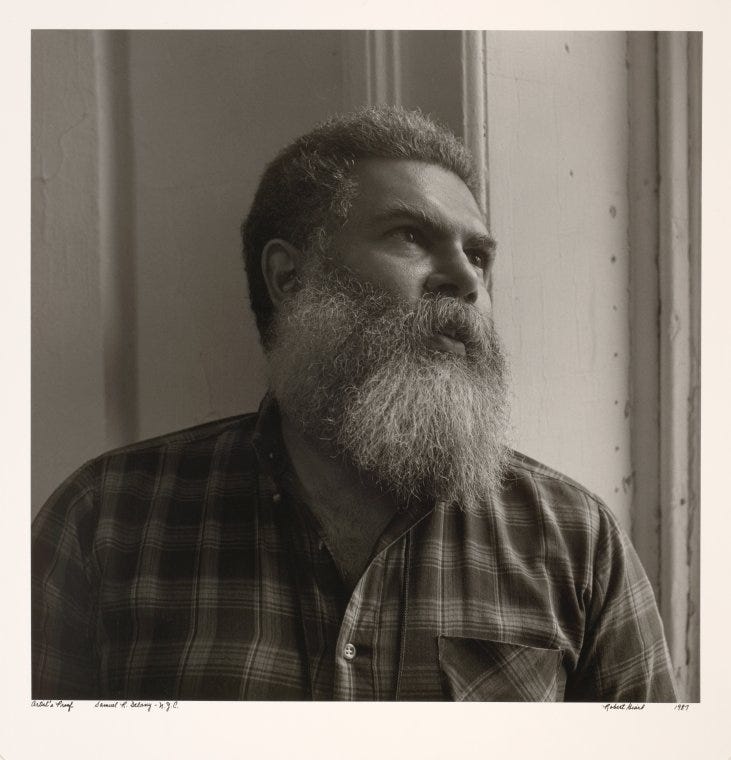Delany's Words, by Max Levin
"In each of the books I read, I encountered words that I had never seen before."
This is a bonus feature of Know-It-All, a zine about obsession and fandom. Here, Max Levin shares a few words from his ongoing list of vocabulary gleaned from the works of Samuel Delany. Know-It-All zine is best read in print. To order a copy, go here.
A couple of years ago, I took up the momentous project of reading Samuel R. Delany. I started with his 1988 autobiography The Motion of Light In Water: Sex and Science Fiction in the East Village, and was immediately captivated by Delany’s polymathic genius, his facility with language, and his living commitment to radical sexual politics. I read one book after another, alternating between nonfiction and fiction, and by now I’ve reached twenty—just about half of Delany’s prolific output. In each of the books I read—including science fiction novels, realistic fiction, memoir, pornography, and literary theory—I encountered new words that I had never seen before. I started jotting these words down as I came across them. Last summer, I connected with Delany on Facebook, we struck up a dialogue, and he invited me to his home in Philadelphia, where we spoke for four hours about life and language.
Here are 15 of the more than 100 words on my list, with the original passages where I found them. Delany uses scientific, ancient, and mutated words anew, expanding their syntactic and narrative possibilities.
eidolon (noun): 1. an idealized person or thing 2. a specter or phantom
This is not a useful city. Very little here approaches any eidolon of the beautiful. - Dhalgren (1974)
acedia (noun): spiritual or mental sloth; apathy
Alcoholism, compulsive gambling, and homosexuality seem to take top priority as minor eccentricities that various great artists have engaged in (sometimes discouraging combinations of two or more) with sadism, masochism, and acedia running close seconds. - In Search of Silence: The Journals of Samuel R. Delany, Vol. 1, 1957-1969 (2017)
saprophytic (adjective): obtaining food by absorbing dissolved organic material
The tenebrous city, city without time, the generous saprophytic city: it is morning and I miss the clear night. - Dhalgren (1974)
attelets (noun pl.): small decorative metal skewers used to garnish food
The illusion of an ordered social matrix is complete, but it’s spitted through on all these cross-cultural attelets. It is a vulnerable city. - Dhalgren (1974)
lacustrine (adjective): related to or associated with lakes
When I turned back from the lacustrine decay, he was pulling his hood further down his forehead with thick thumb and waxy forefinger. - Dhalgren (1974)
callipygous (adjective): having well-shaped buttocks
Philip swallowed, his hand, on its hirsute forearm, dropped below the table; the forearm moved back and forth, and the hand emerged, somewhat drier. “Marny—you remember her from my commune, Marny? Small, dark—?” The other hand came up and together they described a near callipygous shape. - Trouble on Triton: An Ambiguous Heterotopia (1976)
shawm (noun): a medieval and Renaissance wind instrument, forerunner of the oboe, with a double reed enclosed in a wooden mouthpiece, and having a penetrating tone
She arrived the next afternoon, with silver flute, double Indian flute, hose pipe…ocarina, kazoo, practice clarinet, nose flute, and shawm. - Heavenly Breakfast: An Essay on the Winter of Love (1979)
amphibrachic (adjective): consisting of a metrical foot with a long syllable between two short syllables in quantitative verse, or a stressed syllable between two unstressed syllables in accentual verse
And anyone with an amphibrachic name was always in for ribbing. - Tales of Nevèrÿon (1978)
apocopation (noun): a linguistic process that involves the loss of one or more sounds or syllables from the end of a word
Etymologically, of course, "camp" was an apocopation of "camp follower." Camp followers were the women, frequently prostitutes, who followed the armies across Europe from military camp to military camp. - Coming / Out (1996) quoted from Shorter Views: Queer Thoughts and the Politics of the Paraliterary (1999)
abscissa (noun): (in a system of coordinates) the x-coordinate, the distance from a point to the vertical or y -axis measured parallel to the horizontal or x-axis.
Lay ordinate and abscissa on the century. Now cut me a quadrant. Third quadrant if you please. I was born in ‘fifty. Here it’s ‘seventy-five. - Driftglass (1971) quoted from Aye, and Gomorrah: And Other Stories (2003)
kippages (noun pl.): an excited or irritated state
Arnold had gone through paranoid kippages about their not wanting to put a black man’s image on the cover. – Dark Reflections (2007)
anent (preposition): concerning; about
I do not know my feelings, yet the feelings I have already anent this matter, as well as the feelings I know are to come, wrack me as lava from Kromhatch Kone shatters frozen scalings collected on the south face. - Stars in My Pockets Like Grains of Sand (1984)
chrestomathy (noun): a selection of passages used to help learn a language or subject
Roots of Imagination: A Chrestomathy (2023)
alkahest (noun): the hypothetical universal solvent sought by alchemists
“I’m trying to–” Kid looked up at Bill, frowning in the pause– “to construct a complicitous illusion in lingual catalysis, a crystalline and conscientious alkahest.” – Dhalgren (1974)
ekpyrosis (noun): (Stoic philosophy) the supposed periodic destruction of the universe
EKPYROSIS – That’s what Hasler had written just before he and the Mad Man had gone down to the Pit… Had that remarkable philosopher been explaining the meaning of that all-consuming Heraclitean fire to Mad Man Mike sometime earlier that day–that fire which is itself the Heraclitean notion of change and flux raised to such a level beyond love or rage that nothing can escape it, that no man’s or woman’s flow can quench it? – The Mad Man (1994)
Max Levin is an artist and curator based in New York City.



